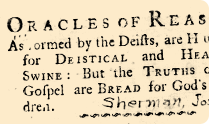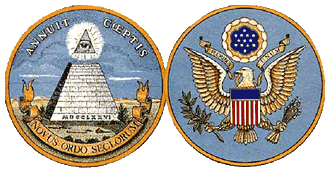Deism and the Founding of the United States
Thursday, January 28, 2010
7:00 p.m.–8:30 p.m. (EST)

Leader
Associate Professor of History
Virginia Commonwealth University
About the Seminar
During the 17th and 18th centuries, many “freethinking” Europeans embraced Deism, a theology that subjected religious truth to the authority of human reason. In colonial America, Deism found few adherents, but those who were attracted to it tended to be wealthy and educated, leaders in colonial society and politics. Today, debate swirls around the role Deism played in the founding of the nation. What was this “religion of nature”? How can we explain it to students? Who among the Founders were Deists? What influence did Deism have on the culture of the new nation?

Enter Moodle Forum
Assigned Readings
To incorporate seminar texts into your teaching, we offer the National Humanities Center's Primary Document Application Form.- Darren Staloff, “Deism and the Founding of the United States” in “Divining America: Religion in American History” from the National Humanities Center
- Hannah Adams, A View of Religions in Two Parts (1801), excerpts
- The Declaration of Independence (1776)
- An Act for Establishing Religious Freedom, Passed in the Assembly of Virginia (1786)
- Thomas Paine, Age of Reason, excerpts
- Josiah Sherman, Oracles of Reason (1787), excerpts
- Great Seals of the United States, proposed by Franklin and Jefferson (1776), and Thomson (1782), U.S. Department of State brochure, 1996
- Political cartoon: “The Providential Detection,” 1800 (showing Jefferson and the altar of Gallic despotism)
For Further Study
- Kerry S. Walters, The American Deists (1992)
- David Holmes, The Faiths of the Founding Fathers (2006)
